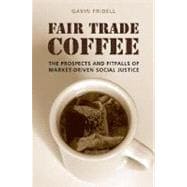
Note: Supplemental materials are not guaranteed with Rental or Used book purchases.
Purchase Benefits
What is included with this book?
| List of Tables and Figures | p. ix |
| Acknowledgments | p. xi |
| Abbreviations | p. xv |
| Introduction: Fair Trade and Global Capitalism | p. 3 |
| The Fair Trade Network and Development Theory | p. 7 |
| The Global and Local Dimensions of Fair Trade Coffee | p. 17 |
| Historical and Theoretical Origins of the Fair Trade Network | p. 22 |
| Embedded Liberalism and the Rise of the Fair Trade Movement | p. 24 |
| Neoliberalism and the Decline of the Fair Trade Movement | p. 34 |
| The Fair Trade Network, Phase 1: Promoting Alternative Markets (1940s-1980s) | p. 39 |
| Conclusion: The Theoretical Foundations of the Fair Trade Network | p. 46 |
| Neoliberal Globalization and the Fair Trade Network | p. 52 |
| The Fair Trade Network, Phase 2: Reforming Conventional Markets (1988 to the present) | p. 53 |
| Expanding the Fair Trade Market | p. 63 |
| Contemporary Perspectives on the Fair Trade Network | p. 83 |
| Conclusion: The Fair Trade Network and Neoliberalism | p. 99 |
| Coffee and the Capitalist Market | p. 101 |
| A Short History of Coffee and Capitalism | p. 103 |
| The Tendency Towards Monopoly in the North | p. 113 |
| The Extended Cycles of Boom and Bust in the Coffee Market | p. 117 |
| Class, Race, and Gender Exploitation in the Coffee Industry | p. 124 |
| Conclusion: The Historical and Structural Roots of Exploitation | p. 132 |
| Coffee and the 'Double Movement' | p. 135 |
| The International Coffee Agreement (ICA), 1963-1989 | p. 139 |
| Instant Coffee and 'Forward Integration' | p. 148 |
| The Colombian 'Price Premium' | p. 151 |
| Costa Rica: Regulated Coffee Industry and Social Welfare State | p. 158 |
| Fair Trade Coffee in Historical Perspective | p. 167 |
| Fair Trade in Mexico: The Case of UCIRI | p. 173 |
| Historical Background | p. 174 |
| Assessing UCIRI's Development Project | p. 191 |
| Conclusion: Assessing UCIRI's Capabilities and Concessions | p. 220 |
| Fair Trade Coffee in Canada | p. 225 |
| The History of Fair Trade Coffee in Canada | p. 228 |
| Comparing the Impact of Fair Trade Partners in the North | p. 243 |
| The Ethical Consumer and Commodity Fetishism | p. 263 |
| Conclusion: The Future of Fair Trade in Canada | p. 271 |
| Conclusion: Fair Trade as Moral Economy | p. 276 |
| Fair Trade as Shaped Advantage | p. 277 |
| Fair Trade as Alternative Globalization | p. 279 |
| Fair Trade as Decommodification | p. 280 |
| Fair Trade as Moral Economy | p. 283 |
| Notes | p. 293 |
| References | p. 307 |
| Index | p. 333 |
| Table of Contents provided by Ingram. All Rights Reserved. |
The New copy of this book will include any supplemental materials advertised. Please check the title of the book to determine if it should include any access cards, study guides, lab manuals, CDs, etc.
The Used, Rental and eBook copies of this book are not guaranteed to include any supplemental materials. Typically, only the book itself is included. This is true even if the title states it includes any access cards, study guides, lab manuals, CDs, etc.